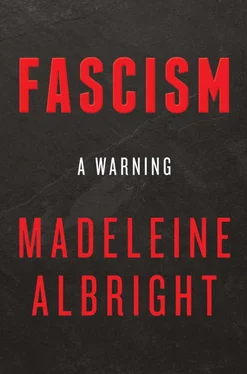Most political movements of appreciable size are populist to one degree or another, but that doesn’t make them Fascist, or even intolerant. Whether they seek to limit immigration or expand it, criticize Islam or defend it, lobby for peace or agitate for war, all are democratic, provided they pursue their goals by democratic means. What makes a movement Fascist is not ideology but the willingness to do whatever is necessary—including the use of force and trampling on the rights of others—to achieve victory and command obedience.
It is worth remembering, too, that Fascism rarely makes a dramatic entrance. Typically, it begins with a seemingly minor character—Mussolini in a crowded cellar, Hitler on a street corner—who steps forward only as dramatic events unfold. The story advances when the opportunity to act comes and Fascists alone are prepared to strike. That is when small aggressions, if unopposed, grow into larger ones, when what was objectionable is accepted, and when contrarian voices are drowned out.
Soon enough, the government that silences a media outlet finds muffling a second easier. The parliament that outlaws one political party has a precedent for banning the next. The majority that strips a particular minority of its rights doesn’t stop there. The security force that beats protesters and gets away with it doesn’t hesitate before doing so again, and when repression helps a dictator in country A to extend his hold on power, the rulers in country B embark on a parallel road. Before too long, Mussolini’s prescription has been followed and once again, feather by feather, the chicken is plucked.
Consider the testimony of a well-educated but not politically minded German who experienced the rise of the Third Reich:
To live in this process is absolutely not to be able to notice it—please try to believe me…. Each step was so small, so inconsequential, so well explained or, on occasion, “regretted,” that, unless one were detached from the whole process from the beginning, unless one understood what… all these “little measures” that no “patriotic German” could resent must some day lead to, one no more saw it developing from day to day than a farmer in his field sees the corn growing….
And one day, too late, your principles, if you were ever sensible of them, all rush in upon you. The burden of self-deception has grown too heavy, and some minor incident, in my case my little boy, hardly more than a baby, saying “Jew swine,” collapses it all at once, and you see that everything, everything, has changed and changed completely under your nose.
GIVEN THAT FASCISM TENDS TO TAKE HOLD IN A STEP-BY-STEP manner rather than by making one giant leap, could it ever proceed very far in America before being stopped? Is the United States immune to this malady—or susceptible?
Before addressing those questions, I ask you to envision Uncle Sam in his long white nightshirt, tossing and turning, his sleep disturbed by three very bad dreams.
In the first, reactionary billionaires conspire to monopolize media platforms and pour their riches into the campaigns of favored candidates who, when in office, ensure the selection of compliant judges. Laws are enacted to ban Muslim immigrants, criminalize abortions, unfairly restrict voting, divert funding for public education to private schools, and drill for oil here, there, and everywhere. The president is given full authority to issue or revoke broadcasting licenses, expand Guantánamo to include domestic criminal suspects, and bar investigations of himself. From cradle to grave, an increasing number of citizens spend their lives within a conservative echo chamber, where they watch nothing but Fox News, memorize the Breitbart catechism, and learn only what goose-stepping right-wingers want them to know. Finally, as climate change advances and epic floods inundate our cities, heavily armed civilian militias are organized to protect private property, made bold by the promise of presidential pardons should anyone pull a trigger in “self-defense.”
Nightmare number two: Wealthy liberals from Hollywood and New York invest their money in favored candidates who, when elected, conspire to enforce rigid standards of political correctness across all the major institutions of society—government, police, media, sports, theater, universities, and kindergarten classrooms. Anyone who violates these vague and unwritten norms, or is accused of having done so, is labeled a bigot and fired. Right-wing speakers are barred from public gatherings because their exercise of free speech might injure the sensitivities of club-wielding anti-Fascists. Gender-specific bathrooms are banned as discriminatory, and terrorists pour across our borders because to stop them would require racial profiling. The Second Amendment is repealed, fossil fuels are prohibited, and an increasing number of citizens spend their entire lives within a Socialist echo chamber, learning only what Fascist liberals want them to know.
Nightmare number three: The United States is hit by multiple terror attacks, killing thousands, with responsibility claimed by U.S.-based Muslim radicals. A shaken president begs Americans to trust their government and not take the law into their own hands. Although acknowledging the need for toughness, the White House refuses to round up Muslims or shut mosques down. In the wake of yet another terrorist assault, and another, and another, a mesmerizing young orator appears on television—and Twitter—to accuse leaders from both major parties of cowardice. He calls for a revolution that will free the country from the lies that have been sapping its will and shackling its might. He vows to smash and destroy the terrorists just as they have done to the innocent men, women, and children slain in their loathsome strikes. He pledges a baptism by fire that will bring about a great awakening, the rebirth of America as it used to be—independent, proud, brave, pure, and worthy of God’s blessing. He beseeches listeners to prepare their minds and bodies for the struggles to come—not only against the terrorists but also against their apologists and enablers. He warns them that their enemies are already preparing to attack, so their only chance is to strike first. “We must not hesitate,” he shouts. “They will say we are barbarians, and they are right. We want to be barbarians. It is an honorable title. Let us harden our hearts and take America back!”
I PUT THE QUESTION TO MY CLASS OF GRADUATE STUDENTS AT Georgetown: “Can a Fascist movement establish a significant foothold in the United States?” Immediately, one young man responded, “Yes, it can. Why? Because we’re so sure it can’t.” His argument is that Americans have so much faith in the resilience of our democratic institutions that we will ignore for too long the incremental erosion that is taking place in them. Instead of mobilizing, we will proceed merrily along, expecting all to turn out for the best, until one morning we open our eyes, draw back the curtains, and find ourselves in a quasi-Fascist state.
The student explained that, in his view, neither Democratic nor Republican leaders know what to do about Trump. They still haven’t grasped how he could have been nominated and elected while ignoring every piece of high-priced strategic advice he received and doing or saying enough offensive things to doom any other candidate a dozen times over. Party leaders don’t understand why, through the many tribulations of his unfolding presidency, Trump’s political base has remained combative and firm—and what politicians can’t comprehend, they won’t be able to cure.
The president’s poll numbers are mediocre, it’s true, but they are still more robust than those of the congressional leaders who have been forced to cross sabers with him. Yet those leaders continue to engage in the kind of partisan spats that opened the door to Trump in the first place. The Republicans appear gutless because few have dared complain even while their party is taken over by people who despise them; the Democrats seem unaware that something similar might happen to them. The vital center, which in the past has saved the country from divisions over a host of contentious issues, has become a lonely place—historically an augury of more extreme problems in the offing.
Читать дальше
Конец ознакомительного отрывка
Купить книгу












